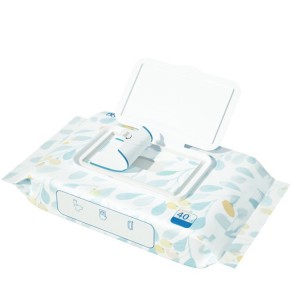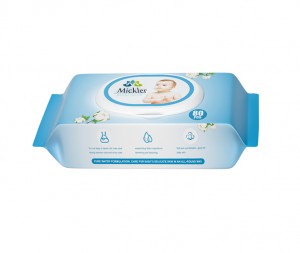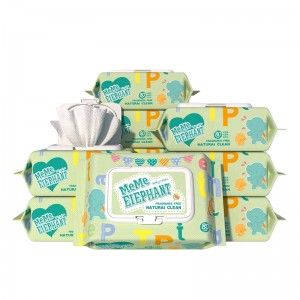Skin-Friendly Wet Wipes: Learn Which Types Are Safe

Wet wipes are so handy to have around that you may have multiple brands and types around your house. Popular ones include baby wipes, hand wipes, flushable wipes, and disinfecting wipes.
You may be tempted to occasionally use a wipe to perform a function it’s not intended to do. And sometimes, that may be okay (for example, using a baby wipe to freshen up after a workout). But other times, it could be harmful or dangerous.
In this article, we go over the different types of wipes available and explain which ones are safe to use on your skin.
Which Wet Wipes are Safe for Skin?
It’s important to know which types of wet wipes are okay to use on skin. This is especially important if you or your children have sensitive skin, suffer from allergies, or have any skin conditions, such as eczema.
Here is a quick list of the skin-friendly wet wipes. We go into detail about each one below.
Baby wipes
Antibacterial hand wipes
Sanitizing hand wipes
Flushable wipes
These types of wet wipes are NOT skin-friendly and should not be used on your skin or other body parts.
Disinfecting wipes
Lens or device wipes
Baby Wipes are Skin-Friendly
Baby wipes are designed to be used for diaper changes. The wipes are soft and durable, and contain a gentle cleansing formula specially made for baby’s delicate skin. They can be used on other parts of a baby or toddler’s body, such as their arms, legs, and face.
Antibacterial Hand Wipes are Skin-Friendly
Antibacterial wipes are designed to kill bacteria on hands so are safe to use on skin. Many brands of hand wipes, such as Mickler Antibacterial Hand Wipes, are infused with moisturizing ingredients like aloe to help soothe hands and prevent dry and cracked skin.
To get the most out of antibacterial hand wipes, make sure to wipe up to the wrists, both sides of your hands, in between all fingers, and your fingertips. Let your hands air dry completely after use and discard the wipe in a trash can.
Sanitizing Hand Wipes are Skin-Friendly
Sanitizing hand wipes differ from antibacterial hand wipes in that they contain alcohol. High alcohol hand wipes such as Mickler Sanitizing Hand Wipes contain a proprietary 70% alcohol formula that is clinically proven to kill 99.99% of commonly found bacteria while also removing dirt, grime, and other impurities from your hands. These wet wipes are hypoallergenic, infused with moisturizing aloe and vitamin E, and are individually wrapped for portability and convenience.
Similar to antibacterial hand wipes, wipe all areas of your hands thoroughly, allow them to air dry, and throw out used wipes in a trash can (never flush in a toilet).
Flushable Wipes are Skin-Friendly
Moist toilet tissue is specially developed to be gentle on delicate skin. For example, Mickler Flushable Wipes are soft and durable to provide a comfortable and effective cleaning experience. Flushable* wipes can be fragrance-free or gently scented. Many of them contain moisturizing ingredients, such as aloe and vitamin E, for a more soothing wiping experience in your nether regions. Look for hypoallergenic wipes that are free of parabens and phthalates to minimize skin irritation.
Disinfecting Wipes are NOT Skin-Friendly
Disinfecting wipes contain chemicals that kill bacteria and viruses, which may cause skin irritation. These types of wipes are made to clean, sanitize, and disinfect nonporous surfaces, such as countertops, tables, and toilets.
Lens Wipes are NOT Skin-Friendly
Pre-moistened wipes designed to clean lenses (eyeglasses and sunglasses) and devices (computer screens, smartphones, touch screens) are not intended for cleaning your hands or other body parts. They contain ingredients specially designed to clean glasses and photography equipment, not skin. We recommend washing your hands with soap and water after throwing away the lens wipe.
With so many different types of wipes available from the Mickler brand, you’ll always have the type you need to make your life cleaner and more convenient.


